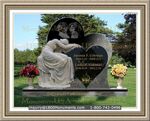|
Facts To Expect When Considering Jewish Funeral Traditions
Following Jewish funeral traditions, mourners should never leave the deceased unattended. A Shomer, or "watchcmen", must stay with the deceased from their death until the time of the funeral and burial. The family typically supplies the watchmen and other family and close friends in mourning will stay with the body as well. Upon a death, the family must first call the rabbi, who will proceed with funeral arrangements and set a time for the funeral. Funerals are in the temple or synagoge, although modern Jews often hold graveside services only.
Jews do not believe in viewing the body after death; it is disrespectful because the deceased person cannot look back at you. Therefore, Jewish funerals are usually closed casket.
Jews typically do not embalm the deceased, unless it is required by law. Instead, the Chevra Kadisha, a sacred society of Jewish followers, prepare the body for burial. They perform the Jewish Taharah, a purification process.
The body is first ritually bathed and then dressed in the Tachrichim, or shrouds, the traditional burial garment. It is a simple white garment that contains no pockets. This symbolizes the fact that the deceased takes nothing with them when they depart this world and that God will not judge on material possessions but rather their deeds and merits.
Families are able to choose their own caskets and make decisions regarding funeral details, however Jewish custom calls for wooden caskets with no metal and no flowers at the funeral.
The funeral typically takes between 20 and 30 minutes in which the rabbi with conduct a reading of the Psalms, other chosen Scripture readings, and a reading of the eulogy. Prior to or following the service, family and other mourners conduct the K'riah, or rendering of the garment, where they tear their clothes or place a black ribbon on their clothes. This shows others that they are in mourning for the deceased. These Jewish funeral traditions have been somewhat modified over time, but are generally followed by most Jews.
|
|



























